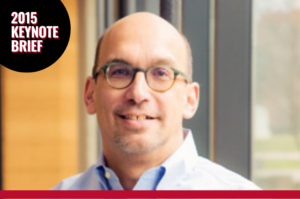By Meera Naqvi
 Keynote speaker Dr. Jeff Levi called public health “a broad and daunting landscape,” but he emphasized that the health of Americans be improved if public health professionals, medical providers, and social service agencies combine forces and work together.
Keynote speaker Dr. Jeff Levi called public health “a broad and daunting landscape,” but he emphasized that the health of Americans be improved if public health professionals, medical providers, and social service agencies combine forces and work together.
The United States ranks at the bottom of a list of 17 industrialized countries on most health indicators, said Levi, Executive Director of the Trust for America’s Health. The conventional wisdom is that this happens even though “the U.S. way outspends other countries on healthcare,” he said.
But appearances can be misleading. If you add up what other rich nations spend on both healthcare and social services, their costs are very close to per capita spending in the United States. Health outcomes in the U.S. may be worse, however, because we lag the rest of the industrialized world when it comes to investment in services such as housing and education. Now that the Affordable Care Act is in place, the Centers for Medicare and Medicaid Services emphasizes that a national prevention strategy will mean better coordination of medical and social services. This makes sense, Levi said, because much of what affects health happens outside the four walls of the clinic, he emphasized.
“Investment in social services has a health return,” Levi said. The two most important social determinants of health are housing and education, and “the biggest predictor of longevity is income and or education status.”
Children who do well in school will be healthier for their entire lives, and an early start is key. Pre-school programs for children as young as three make a big long-term difference in health outcomes. “Early development is vital,” he said.
Stable, safe housing is also key; people with housing insecurity experience are more likely to become ill.
Levi points to Hennepin County, Minnesota, as a place where medical and social service agencies have partnered to successfully. Their integrative approach has improved the outcomes for residents while also cutting spending, Levi said.
Among their initiatives are a unified data system and an outpatient center that helps people recover from alcohol or substance abuse. The partnership takes a holistic approach, so that if a homeless person seeks medical care they will also receive housing assistance. Costs of care fall for someone who is safely housed.
“Yes, we’re doing God’s work in public health, but we also have to show return on investment,” Levi said.
